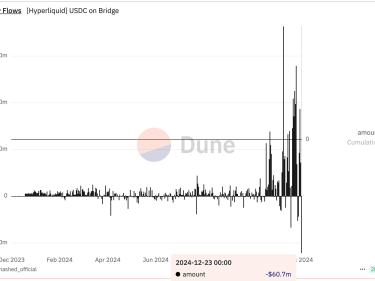BTC
100,914.09
-5.37%
ETH
3,661.28
-6.59%
USDT
0.99951845
-0.05%
XRP
2.35
-9.63%
SOL
207.40
-7.14%
BNB
693.21
-3.95%
DOGE
0.36267171
-9.06%
USDC
0.99991613
+0.01%
STETH
3,654.73
-6.52%
ADA
0.98307087
-7.29%
TRX
0.26005930
-7.40%
AVAX
43.48
-9.91%
LINK
25.29
-9.74%
SHIB
0.0₄24475
-7.89%
TON
5.49
-6.23%
WBTC
100,535.46
-5.36%
SUI
4.39
-6.13%
XLM
0.40258772
-7.02%
HBAR
0.28060427
-1.98%
BCH
486.61
-8.93%
Delisting a token from major exchanges is often perceived as a lack of confidence in its viability or future, triggering negative market sentiment around the affected token.
Updated Dec 18, 2024, 12:46 p.m. UTCPublished Dec 18, 2024, 12:32 p.m. UTC

What to know:
- A Binance delisting decision sent prices of defunct crypto exchange WazirX’s WRX tokens down 60% in an hour.
- The delisting is another blow for the once-darling Indian exchange WazirX.
- WazirX, still reeling from the financial and reputational damage, has worked to recover the funds with limited success.
A Binance delisting decision sent prices of defunct crypto exchange WazirX’s WRX tokens down 60% in an hour, even as the exchange hopes for a “fresh start” of its platform.
Binance said Wednesday that it was delisting WazirX’s WRX, along with Kaon (AKRO) and Bluzelle (BLZ), as part of a regular review of tokens that no longer meet its offering standards.
Story continues below
Delisting a token from major exchanges is often perceived as a lack of confidence in the token’s viability or future, triggering a negative market sentiment around the affected token. Prices of AKRO and BLZ fell as much as 40% after the announcement, but WRX was the hardest hit.
WRX token exchange hands at 10 cents as of Wednesday, down 98% from a 2021 peak above $5.

The delisting is another blow for the once-darling Indian exchange WazirX. It was the biggest exchange in India by volumes and popularity before a $230 million hack in July, accounting for over 45% of the total user assets reserves cited by the exchange in a June report. The exchange has since filed for a restructuring process in Singapore to clear its liabilities.
The hacker laundered all the stolen funds to various addresses using Tornado Cash to obscure the transactions, as CoinDesk reported in September, further dampening hopes of a full recovery.
WazirX, still reeling from the financial and reputational damage, has worked to recover the funds with limited success. It has faced criticism for its handling of the crisis, especially concerning user communication and fund recovery processes.
The exchange is making various efforts to restart operations. The company said in a Wednesday post it plans to restart the business and launch a decentralized exchange, intending to keep the brand alive.
“We are gearing up for a fresh start with enhanced services and a recovery-driven approach for Scheme Creditors,” the company said on X. “Following Scheme approval (subject to legal and regulatory requirements), we plan to reopen the WazirX platform and launch a decentralized exchange (DEX) with innovative features to enhance user experience and provide a more robust platform.
That came a day after WazirX floated the concept of recovery tokens (RTs), which are proposed as a mechanism to compensate users for losses the hack.
These tokens will be airdropped to creditors based on their platform balances, offering recovery through future platform profits, potential buybacks, and trading on open markets, per a post.
Shaurya is the Co-Leader of the CoinDesk tokens and data team in Asia with a focus on crypto derivatives, DeFi, market microstructure, and protocol analysis.
Shaurya holds over $1,000 in BTC, ETH, SOL, AVAX, SUSHI, CRV, NEAR, YFI, YFII, SHIB, DOGE, USDT, USDC, BNB, MANA, MLN, LINK, XMR, ALGO, VET, CAKE, AAVE, COMP, ROOK, TRX, SNX, RUNE, FTM, ZIL, KSM, ENJ, CKB, JOE, GHST, PERP, BTRFLY, OHM,
BANANA, ROME, BURGER, SPIRIT, and ORCA.
He provides over $1,000 to liquidity pools on Compound, Curve, SushiSwap, PancakeSwap, BurgerSwap, Orca, AnySwap, SpiritSwap, Rook Protocol, Yearn Finance, Synthetix, Harvest, Redacted Cartel, OlympusDAO, Rome, Trader Joe, and SUN.





